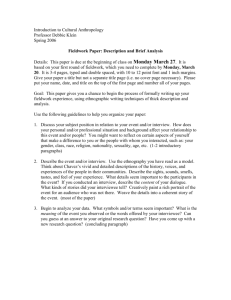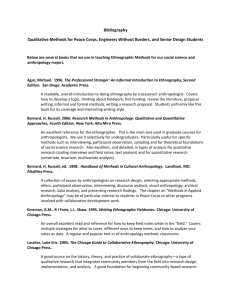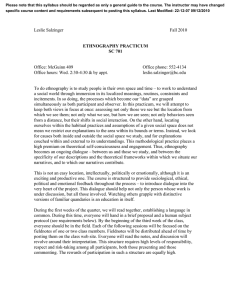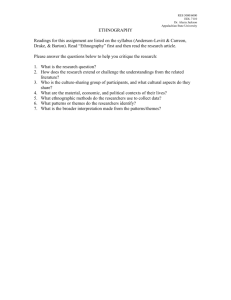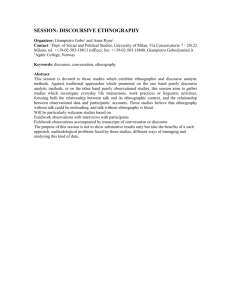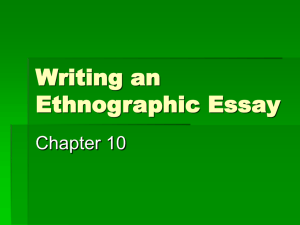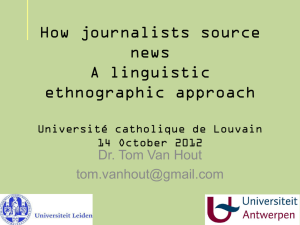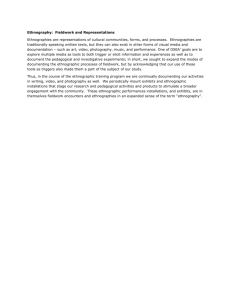INTO454001/SOCY454001- Boston College Spring 2015 Qualitative Methods in a Globalizing World
advertisement
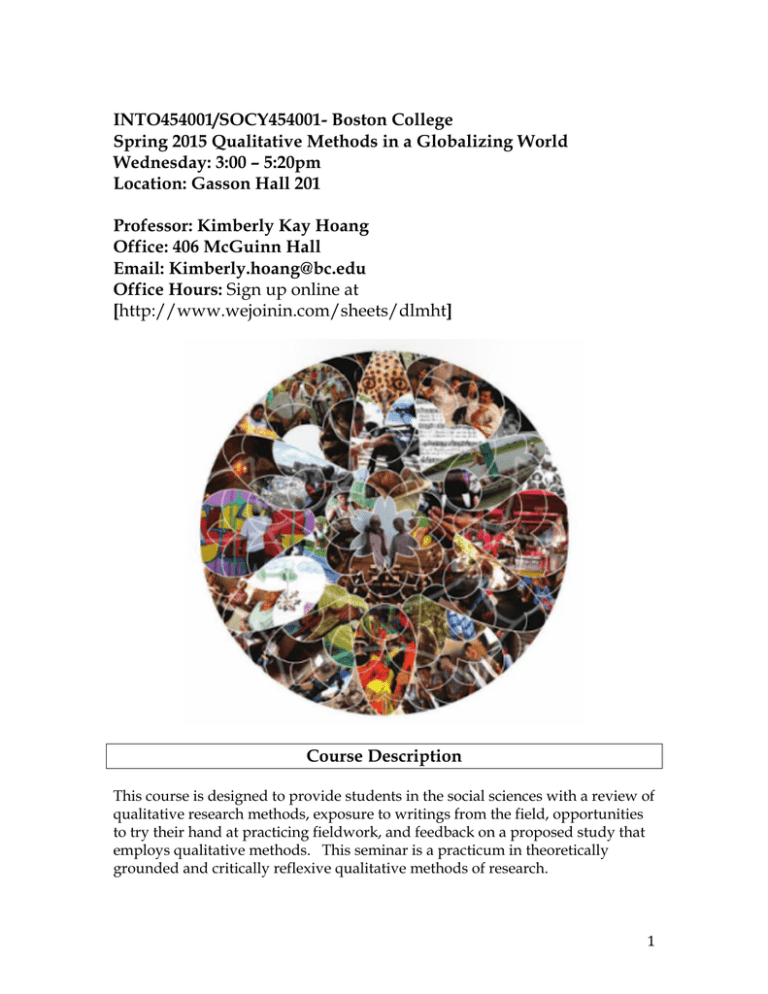
INTO454001/SOCY454001- Boston College Spring 2015 Qualitative Methods in a Globalizing World Wednesday: 3:00 – 5:20pm Location: Gasson Hall 201 Professor: Kimberly Kay Hoang Office: 406 McGuinn Hall Email: Kimberly.hoang@bc.edu Office Hours: Sign up online at [http://www.wejoinin.com/sheets/dlmht] Course Description This course is designed to provide students in the social sciences with a review of qualitative research methods, exposure to writings from the field, opportunities to try their hand at practicing fieldwork, and feedback on a proposed study that employs qualitative methods. This seminar is a practicum in theoretically grounded and critically reflexive qualitative methods of research. 1 The first objective of this course is to provide an overview of the key issues in the epistemology, practice, ethnics and the politics of participant observations. In the first six weeks of the course we will cover various traditions and modalities of qualitative research. Students will evaluate their goals, epistemological questions, field techniques, relational dynamics with research subjects, analytical strategies, representational devices, and ethical quandaries. The second objective of this seminar is to provide students with a “hands-on” experience to the practical tasks, rules, and tricks of the trade in qualitative research. Students will learn how to propose a question, provide a rationale for using ethnographic or interview based research methods, sample and recruit respondents, and develop effective interview questions. We will discuss how to choose and articulate a research problem, put together an empirical puzzle, clear human subjects, and discuss various techniques of interviewing, observation, note taking, and analysis. You will spend as much time “in the field” as you will in the classroom. We will also discuss some of the challenges with conducting research in multiple field sites as well as the hazards with working in sites of political conflict, war zones, or illicit spaces. The third objective of this course is to collectively analyze the data at hand in order to figure out how to turn interview data and ethnographic field notes into “explanations” where new theoretical and conceptual frames can begin to emerge. We will discuss the styles and modalities of writing qualitative research papers and the varied approaches that authors take in discussing their positionality when presenting their work to academic and public audiences. By the end of this course students should have gained at least basic proficiency in their ability to undertake a well-grounded qualitative research project on their own. Summary of Objectives: - Apply a sociological or anthropological approach to the analysis of local, national, and global social problems. - To read qualitative research projects with a “methodological lens” in order to evaluate the empirical puzzle and the methods of inquiry. - To understand the connection between theory and data and think about what constitutes good evidence. - To design and implement your own qualitative study. - To learn the basic techniques of access, observation, interviewing, note taking, analysis, and theory building. Disability Policy: If you are a student with a documented disability seeking reasonable accommodations in this course, please contact Kathy Duggan, (617) 552-8093, at 2 the Connors Family Learning Center regarding learning disabilities, or Paulette Durrett, (617) 552-3470, in the Disability Services Office regarding all other types of disabilities. Course Requirements 1. Class Attendance, Participation, and Collaboration: [5%] Attendance is required. If you have more than two unexcused absences, your final course grade will be lowered by one-third of a grade (e.g., A- ! B+). Students are expected to come to class having completed all the reading assigned for that day and prepared to contribute to discussion. 2. Reading Reflections: [10%] We will be reading several case studies. Generally we will read one book over two class meetings. For each book you must write a two-page review of the book. In these memos, students will not only summarize the main points from the readings they will reflect on what is missing. What kinds of research questions emerge from these existing studies? Students should write these like a book review. a. The memo SHOULD NOT SUMMARIZE the text. Instead it should address these questions: What was the author’s empirical puzzle? Do you think that their chosen method of research best suits their empirical puzzle? How did the author gain access? How did they build rapport? How did their positionality affect their ability to interact with their participants? What were some of the methodological challenges these authors faced? b. You can look at the American Journal of Sociology for sample book reviews. 3. Riding the Bus Exercise: January 28, 2015 [10%] For this project you will choose a bus or train route on the Massachusetts Bay Transportation Authority [the-T] and ride it for at least 50 minutes in one direction. See instructions at the end of the syllabus 4. Ethnography in a Public Space: February 18, 2015 [15%] 5. Neighborhood Walking Tour: [15%] See instructions at the end of the syllabus 6. 2-page research proposal. Due March 12, 2015. [10%] This is a short two-page (double-spaces) research proposal where you outline your proposed research question, situate it within a literature, and discuss your intended method of research. 3 7. Research [30%] [See the back of the syllabus for more detailed instructions]: a. Ethnographic field research-- minimum of 8 weeks of fieldwork (59 Hours weekly plus fieldnote writing) [Undergraduates 4 weeks] b. Interview Methods- (1) interview guide and (8) structured taperecorded interviews along with transcriptions. [Undergraduates 4 interviews] c. Two sets of fieldnotes or two interview transcripts to be posted to the class website. Dates will vary. d. Thorough, attentive, constructive reading of and commenting on your colleagues’ work. This is a HANDS-ON on course that will be VERY INTERACTIVE. You must show up to class in order to take part in this collective effort. If you absolutely must miss a session in which others are presenting work, email them comments in writing (copied to me) by the following Wednesday. 8. 8-10 page FINAL Paper: Research Proposal, Theoretical Memo integrating data, or article length manuscript based on research findings [15%]. Grading Scale 94-100= A 90-93= A86-89= B+ 82-85= B 78-81= B74-77= C+ 70-73= C 66-69= C62-65= D+ 58-61= D 54-57= D53-00= F * A note about grades. I do not grade on a curve nor do I believe in grade inflation. As such, students overall grades will reflect the quality of their work, improvement overtime, and ability to turn assignments in on time. Late assignments are automatically given a ZERO (unless there is an emergency), which will detrimentally affect your grades. Grade Disputes: I will honor all requests for grade changes that are submitted to me in writing. Please know that a request for a grade change can result in a higher or lower grade. 4 Required Texts Case Studies Ralph, Laurence. 2014. Renegade Dreams: Living Through Injury in Gangland Chicago. Chicago: University of Chicago Press. Almeling, Rene. 2011. Sex Cells: The Medical Market For Eggs and Sperm. Book, University of California Press. Zaloom, Caitlin. (2006). Out of the Pits: Traders and Technology from Chicago to London. Chicago, Chicago University Press. Hoang, Kimberly Kay. 2015. Dealing in Desire: Asian Ascendancy, Western Decline, and the Hidden Currencies of Global Sex Work. Oakland: University of California Press. Research Methods Texts Abbott, Andrew. 2004. Chapters I. In Methods of Discovery: Heuristics for the Social Sciences. New York: W.W. Norton & Company. Becker, Howard S. 1998. Tricks of the Trade: How to Think about Your Research While You’re Doing It. University of Chicago Press. Emerson, Robert M., Rachel I. Fretz and Linda L. Shaw. 1995. Writing Ethnographic Fieldnotes. Chicago: The University of Chicago Press. Weiss, Robert. 1994. Learning from Strangers: The Art and Method of Qualitative Interview Studies. New York: The Free Press. Recommended Texts Avishai, Gerber, and Randles (Forthcoming 2013) The Feminist Ethnographer’s Dilemma: Reconciling Progressive Agendas with Fieldwork Realities, Journal of Contemporary Ethnography Bernard, H. Russell ed. 1998. Handbook of Methods in Cultural Anthropology. Altamira Press. Borneman, John and Abdellah Hammoudi, eds. 2009. Being There: The Fieldwork Encounter and the Making of Truth. Blackwell Publishing. 5 Briggs, Charles L. 1986. How to Ask: A Sociolinguistic Appraisal of the Role of the Interview in Social Science Research. Cambridge: Cambridge University Press. Cerwonka, A and Liisa Malkki. 2007. Improvising Theory: Process and Temporality in Ethnographic Fieldwork. University of Chicago Press. Hesse-Biber, Sharlene. 2012. Handbook of Feminist Research: Theory and Praxis. Thousand Oaks: SAGE. Luker, Kristen. 2008. Salsa Dancing into the Social Sciences. Cambridge: Harvard. Malinowski, Bronislaw. 1967. A Diary in the Strict Sense of the Term. New York: Harcourt, Brace, & World. McLean, Athena and Annette Leibing. 2007. The Shadow Side of Fieldwork: Exploring the Blurred Borders between Ethnography and Life. Blackwell Publishing. Rubin, Herbert J. and Irene S. Rubin (2012). Qualitative Interviewing: The Art of Hearing Data. Los Angeles: Sage Publications. Schatzman, Leonard and Anselm L. Strauss. 1973. Field Research: Strategies for a Natural Sociology. New Jersey: Prentice-Hall. Strauss, Aselm L. 1987. Qualitative Analysis for Social Scientists. Cambridge: Cambridge University Press. Van Maanen, John. 1988. Tales of the Field: On Writing Ethnography. Chicago: The University of Chicago Press 6 Weekly Schedule January 14, 2015- Introduction January 21, 2015 – Methods of Discovery| Ideas and Puzzles Abbott, Andrew. 2004. Chapters I. In Methods of Discovery: Heuristics for the Social Sciences. New York: W.W. Norton & Company. Chapter 1 and 2 (Pg. 1-75), Chapter 7 (Pg. 211-242) January 28, 2015- Field Assignment | Bus Tour *Bus Tour Assignment: see instructions at the end of the syllabus Reading: Ralph, Laurence . 2014. Renegade Dreams: Living Through Injury in Gangland Chicago. Chicago: University of Chicago Press. Read the first half of the book February 4, 2015- Reading | Local and Urban Settings “Race, Class, and Ethnography” Ralph, Laurence . 2014. Renegade Dreams: Living Through Injury in Gangland Chicago. Chicago: University of Chicago Press. Finish the Entire Book Two page reflection of the book due February 11, 2015— Relationships and Family Life Almeling, Rene. (2011). Sex Cells: The Medical Market For Eggs and Sperm. Book, University of California Press. Pg.’s 1-24, Pg. 52-83, Pg. 110-141 • Two page reflection of the book due • Rene Almeling will also be a guest speaker in the Department of Sociology Colloquium look out for announcements. February 18, 2015— Field Assignment | Ethnography of Public Space * Ethnography of Public Space: see instructions at the end of the syllabus Abbott, Andrew. 2004. Chapters I. In Methods of Discovery: Heuristics for the Social Sciences. New York: W.W. Norton & Company. February 25, 2015— Studying Elites and Global Capital Zaloom, Caitlin. (2006). Out of the Pits: Traders and Technology from Chicago to London. Chicago, Chicago University Press. Pg.’s 1-92. * Two page research proposal due March 4, 2015—SPRING BREAK March 11, 2015— Zaloom, Caitlin. (2006). Out of the Pits: Traders and Technology from Chicago to London. Chicago, Chicago University Press. Finish the book • Two page reflection of the book due 7 March 18, 2015— Field Assignment| Neighborhood Walking Tour *Neighborhood Walking Tour: see instructions at the end of the syllabus March 25, 2015— Field Assignment | Ethnography or Interviews * Ethnography: see instructions at the end of the syllabus April 1, 2015— Studying Up and Studying Down in a Global World Hoang, Kimberly Kay. 2015. Dealing in Desire: Asian Ascendancy, Western Decline, and the Hidden Currencies of Global Sex Work. Oakland: University of California Press. Pg. 1-103 • Discussion of Walking tour assignment and first foray into ethnography assignment. April 8, 2015— Hoang, Kimberly Kay. 2015. Dealing in Desire: Asian Ascendancy, Western Decline, and the Hidden Currencies of Global Sex Work. Oakland: University of California Press. Finish the book including the methodological appendix • Two page reflection of the book due • Discussion of ethnography April 15, 2015—Field Assignment—Ethnography or Interview April 22, 2015 —LAST DAY OF CLASS *Discuss final papers 8 Riding the Bus Exercise For this project, choose an MBTA bus (train is less preferable) route that you can ride (in one direction) for at least 45 minutes. Ride the bus during daylight hours (class time on January 28th) and take detailed notes about what you see on the bus/train and out the windows. Link your observations to a possible research topic based on the guidelines set up by Andrew Abbott in Methods of Discovery. Think about the following questions: • • • • • • • • • • • • • What areas are you riding through? Can you see changes as you move from one neighborhood to another? What kinds of sidewalk activities do you observe (walking, jogging, street performers, etc)? What does the urban landscape look like? Do you see mostly businesses, residences, schools, parks? What do the buildings look like? What kinds of signs do you see? Do you see graffiti, mural, or public art? What kind of people do you see getting on and off the bus? How do all of these dynamic change as you ride in different neighborhoods? What kinds of interesting research questions emerged from you? What field sites most peak your interest? If you could get off the bus and spend more time in one particular part of the city where would it be? Why? Write a 500-word (2 double spaced pages) reflection that describes what you saw, felt, and experienced on this field trip. 9 Ethnography of a Public Space For this assignment, I want you to pick a public space of your choice and spend three hours there observing your surroundings and taking careful ethnographic field notes of what you see, observe, and notice about the area and the people who occupy that space. Consider this an in-depth kind of people watching. This place must be OFF campus. Example places: • Boston Common • Copley Square • Any Museum around town • A shopping mall • A grocery store • A coffee shop Then I want you to strike up a conversation with a complete stranger and ask them questions about who they are, where they’re from, what they are doing there. How they got to Boston etc. Just let the conversations lead the way. People may turn you down so I would try to approach multiple people. Write a 500-word reflection that describes what you saw, felt, observed, and what you learned from the person who you talked with. 10 Neighborhood Walking Tour Ground Rule: Do NOT travel alone—if you are driving it is best to have at least three in a vehicle together, one to drive, one to navigate and one or two to take notes. Go to the NYTimes Census data on Boston neighborhoods (see link below) and pick two neighbors that are racially and socioeconomically different from each other. You will be driving/taking the subway/walking in BOTH of these neighborhoods. You will be asked to look at these neighborhoods systematically, with careful observation, likely not the way you have viewed them before. DRIVING/ SUBWAY/ WALKING DIRECTIONS In groups of 2-4 you will together come up with a plan and map out your driving/subway/walking directions neighborhood by neighborhood and street by street for pre-approval to me prior to embarking on your trip. You need to pick two neighborhoods that are very different from each other in terms of their (1) socio-economic status (2) racial demographics i.e. racial and ethnic concentrations (3) population change. Please consult with the NY TIMES CENSUS DATA interactive maps in choosing your neighborhoods. http://projects.nytimes.com/census/2010/map I strongly recommend that you print out a map of the areas you will be driving or use GPS, so you do not get lost. Before beginning the tour, review the questions you’ll be asked to answer. IN THE FIELD In the field I suggest you spend some time walking around and familiarizing yourself with the neighborhood. Then stop and speak to a few people and see if you can get them to tell you about their story of migration and what their lives are like now in Boston. Their stories will add a great deal of richness to your reflection paper. In addition, I suggest you bring a notepad or a device where you can take notes on the following: • Size and attractiveness of homes • Upkeep of homes • Landscaping and condition of the yards, sidewalks, etc. • Extent of litter and trash on the streets or in yards • Types of businesses, houses of worship, etc., if any 11 • How many people you see and who they are: age, race, gender, how dressed, etc. • Feelings and Thoughts: What are you feeling as you drive through the area (calm, anxious, etc.) and what are you thinking (“hey, nice place,” for example). REFLECTION Answer the following questions in 1000 words or 4 double-spaced pages. 1. How did you feel driving/walking in the neighborhood? What differences stood out to you? 2. What did the economy of the neighborhood look like? Were there a lot of markets and shops? What kind? How this neighborhood similar to or different from the one you grew up in? 3. Imagine you were a child born in this neighborhood. How would your life be different? Think about family, schools, shopping, worshipping, playing, etc. 4. Who did you meet or talk with while you were there? What did you learn from that conversation? Where appropriate, enrich your answers to the above questions with insights from the course readings and Internet. 12 Research Proposal This may be on a topic of your choice. The purpose of this assignment is to encourage you to situate your research question within a broader subfield within Sociology. You need to be able to clearly state the theoretical and empirical contribution that your research project will make to a particular debate or stand of literature. I will expect a polished research proposal— something you could use to win an outside research fellowship. [I will provide examples]. This will provide a brief outline of the research subject, an argument for why it is worthy of study, 3-4 distinct research questions related to the topic and a short bibliography (5-20 references) relevant to the topic. It is important that you pick a topic which you can conduct research on in the Boston area. Once your proposal is approved you will conduct field work to collect data: interviews or ethnographic field notes. Field Assignments This is probably the most challenging part of the course. Each student will decide whether ethnographic research OR interview based methods is the more appropriate for their study. Ethnographic Field Research— minimum of 3 days of fieldwork (3-5 hours weekly) plus ethnographic fieldnotes. You might want to plan ahead for week where you will be swamped with work from other classes and plan to do 2 days of field research during the light weeks. Again get started on this early and factor in recruitment time. You will need to write fieldnotes for everyday that you conduct research. At the end of the course you will turn in a portfolio with all of your fieldnotes. That portfolio will also have your coding scheme for all three days of field research. • Select a general research question or setting • The first step in ethnography is deciding on a general, initial focus (which will not constrain you if you decide to change later). This focus consists of either: o A setting, such as coffee shops, gyms, faculty offices, poolrooms, DoIT help desk facility, or o A phenomenon in which you are interested, such as the online community, driving, coffee culture, or people’s adaptation to new technology. (These are just examples.) • The setting and phenomena you study must exist. You cannot create something to study, because you are trying to understand how people experience their own world and give meaning to it, not what they would do if they lived in your world. (As with all rules, there are 13 • • • • exceptions to the stricture to study people in their “natural” settings. Some ethnographers purposely disrupt something to see how people cope and try to re-create meaning.) Most ethnographers aim to study subjects whose meaning cannot be understood using quantitative methods. For example, Nardi and Whittaker, in writing about the challenges of geographically distributed work, studied the role of restaurant meals in collaboration. In ethnography within sociology, favorite topics concern deviance, social control, and especially the underdog (prostitutes, criminals, shoplifters, poor people, children and mentally ill patients in institutions). In ethnography within anthropology, favorite topics concern kinship patterns, status, and economic processes within peasant or pre-literate societies. In the fields of information systems, design, HCI, and other technology research, favorite topics have included organizational subcultures, managerial control, work practices, “structuration” (adapting technology use to user needs), relationships with technology, the nature of expertise or know-how, and informal communication and influence processes. When you choose a setting or phenomenon you wish to study, you also make an initial cut at defining comparisons you wish to make. For example, in Whyte’s studies of gangs (1943) focused in part on the group’s power-leaders and followers, insiders and outsiders. Comparisons can help greatly in understanding a setting or phenomenon. (People are much better at comparing things than making absolute judgments.) Step 1 – Choose a “high action” setting for starting some fieldwork. Decide on an initial comparison (such as two groups, or two situations). Choose an unfamiliar setting, so you can look at what happens with “fresh eyes.”(You should not observe your own workplace, club, or family.) Set aside an hour to closely observe this setting. Below are some suggestions for settings to study. Ask us if you need ideas relevant to your research: o Coffee shops o Nursing home (observe staff and residents both) o Halfway house or shelter o Fast food restaurant including cooking staff and cooking areas o Security checking at the airport – all participants o Crowded computer clusters o Support staff lunchroom during lunch 14 Interview Methods— you will construct an interview guide which we will discuss in class. I will also provide sample interview guides. Then you will recruit and interview 3 different respondents, transcribe the interviews, and code at least half of them. In addition you will provide a 1-2 page narrative for each interview. The narratives will provide a brief ethnographic description of where the interview took place, the respondents’ background characteristics, and some of the main themes that emerged from the interview. At the end of the course you will turn in a portfolio with all interview transcripts and relevant coding schemes. Coding your Data— we will discuss a variety of different methods for coding your data. For the purpose of this class hand-written codes will be sufficient. However, I highly recommend that you all familiarize yourselves with various programs like Nivivo, Atlas’TI, and HyperRESEARCH. o One software that I highly recommend is HyperREASEARCH designed here at Boston College by Professor Sharlene HesseBiber. This is an excellent software available at a very reasonable price for Boston College students. HyperRESEARCH does a wonderful job of enabling you to code multiple sources of data (e.g. graphics, audio, and video), conduct analysis of your data, and engage in theory building. See: http://www.researchware.com/ Presentation and Class Participation--- This is a hands-on course. Therefore, in order to successfully execute this course ALL students must be present. Attendance is critical therefore there will be NO excused absences unless there is some major emergency! For the second half of the course each week three students will present their field notes along with their own analysis. That week the rest of the members in the course will read the fieldnotes and provide more depth to the analysis. Final Assignment— This is a VERY OPEN ended assignment that will vary for each student based on the results of their research. Each student will turn in a 810 page paper. This paper can be a: research proposal, theoretical memo, or full length article manuscript. This will depend on how much research you were able to conduct during the course of the semester. 15
